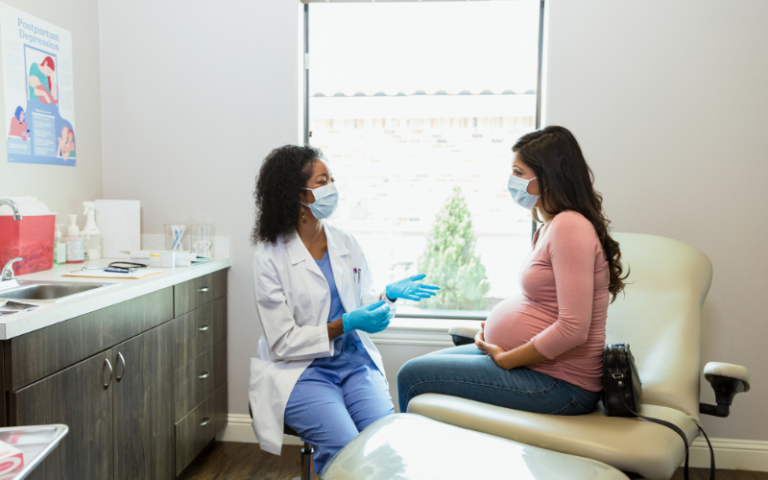Understanding outcomes for mothers & babies after Covid-19 exposure during pregnancy
Dr Sara Hillman (UCL Faculty of Population Health Sciences) used the Global Engagement Funds to explore how Covid-19 infection impacts women and their babies in India and the UK.

5 July 2022
As the Covid-19 pandemic unfolded, the risks of infection to pregnant women and their babies was unclear. Early in the pandemic, pregnant women in the UK were told to shield at home, since data wasn’t available on the impact Covid-19 could have. Some of the earlier research that was done focused on women after they delivered their babies. However, there was still little information about the possible knock-on effects of women catching Covid-19 at different stages of their pregnancies.
To explore this further, UCL collaborated with one of its strategic partners, the All India Institute Of Medical Sciences (AIIMS) in Delhi. The teams worked with the partner hospitals – UCLH in London and AIIMS itself in Delhi – to recruit pregnant women to take part in the study throughout their pregnancies.
Covid-19 in all trimesters of pregnancy
“The idea of this research was to recruit women throughout pregnancy, test their antibody levels, and look at their outcomes,” Sara explained. “Previously we didn’t know what the specific implications were – particularly about the risk of transmission to babies in the womb – depending on which trimester of pregnancy you caught Covid-19.”
Partnering with AIIMS was crucial to understand whether there were any global differences in this topic too. First the teams had to decide on what they wanted to measure in order to explore the issue, and how they would go about it. They agreed that part of the study would be to test women’s blood during pregnancy and their placentas after delivery for SARS-COV2 placentitis. This is a rare condition in which Covid-19 affects the placenta and can cause complications, particularly later on in pregnancy.
“It proved to be difficult to get the placentas of women in Delhi and easy to get placentas in the UK,” Sara said. This was because many of the women recruited for the study in Delhi were delivering their babies in the community, with some living in more rural settings. On the other hand, most women on the British side of the study delivered in UCLH, meaning the placentas could be sent easily to Great Ormond Street for testing. Despite this difference, the teams were able to collect enough data to draw scientific conclusions from the study, focusing on blood results from the Delhi populations and placentas in the UK cohort.
Good outcomes for most women and babies
“We were able to show that outcomes are very good for most women who get Covid-19 whilst pregnant,” Sara said. “If you get Covid-19, generally you remain very well, and the baby isn't significantly affected by mum having Covid-19.” The team also found that catching Covid-19 during the first trimester of pregnancy does not seem to affect how the placenta responds. “Our interest in the placenta is that if Covid-19 is in the placenta, it could be in the baby due to transmission from mum to baby through the placenta,” Sara explained. “And again, we found the incidence of SARS-COV2 placentitis was very rare.”
The findings have been published in the International Journal of Gynaecology and Obstetrics (IJGO), with a further paper pending with the American Journal of Obstetrics and Gynaecology (AJOG). As well as being reassuring for pregnant women, the research has also contributed to the global understanding of the impact of Covid-19 on pregnancy. “It’s an underfunded area, but this research has had an impact in terms of adding to better global understanding about pregnancy and Covid-19,” Sara said.
Although Sara has been working with AIIMS for a number of years, this project enabled her to make links with other medical professionals in the organisation too. “What was new about this relationship we developed was that I worked with immunologists and pathologists who I hadn’t worked with before,” she said. As well as undertaking this research together, “we were all really interested in deepening relationships and capacity building.
The ability for each team’s obstetrics, pathology and immunology departments to work directly with each other was particularly beneficial. “It's really helped to cement a truly collaborative and equal working relationship,” Sara explained. “Developing this expertise together, and creating an ability to do molecular studies at AIIMS, at the same time as doing them at UCL has been a real find for us.” The teams are planning future partnerships, and they currently have a $5 million bid in with the Wellcome Trust to continue their work on placentation.
Links
- Seroprevalence of SARS-CoV-2 antibodies among first-trimester pregnant women during the second wave of the pandemic in India, International Journal of Gynaecology and Obstetrics
- Further reading: Coronavirus (COVID-19), pregnancy and women’s health, Royal College of Obstetricians & Gynaecologists
- UCL and India
- UCL in South Asia
For the latest news about UCL’s international activity, partnerships and opportunities, subscribe to our bimonthly Global Update newsletter.
 Close
Close

